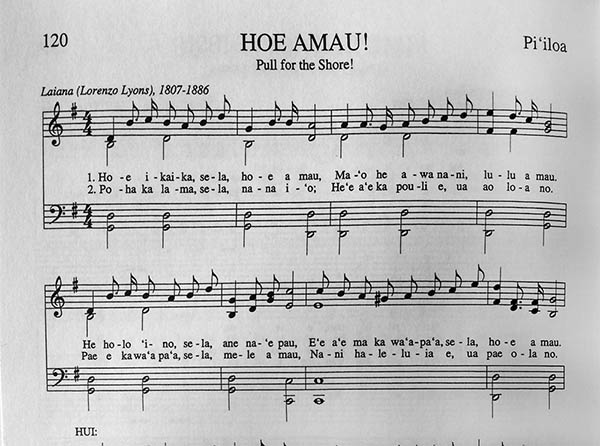 |
 |
 |
|||||
|
Hawaiian Language:
“Through the ‘40s, ‘50s we had a lot of Hawaiian people here,” Emalia says, “so the language was only Hawaiian. My grandparents spoke no English. And then when they tried to, we’d be sitting giggling because they couldn’t make a complete sentence. Well that was so silly, and when we think back now, Whoa! we had the real McCoys with us and didn’t appreciate that. My mother was fluent, uncle them, they were all fluent, and so they would talk to us. My grandfather used to babysit us, so that’s all we heard was ‘ōlelo Hawai‘i. But my parents grew up in a generation that got punished for speaking Hawaiian. They used to get whacked on the hand and they used to have to stay after school and write on the blackboard like ‘I will not speak Hawaiian at school’ a hundred times. “They didn’t listen to the school officials. The school used to send them to the house sometimes and say ‘Don’t talk to your children in Hawaiian. Talk to them in English.’ But my mother said they didn’t listen to him, because that’s all the old folks understood. And the church continued to sing and pray in Hawaiian. We have so many versions of the old church hymnals that were only Hawaiian—that’s all we learned growing up: Hawaiian. Hawaiian music, Hawaiian songs. “Then gradually English became the more dominant language and Hawaiian was just occasional. In our adulthood, we were advised to speak English because there was no future in studying or learning the Hawaiian language. But we have a resurgence now. We’re bringing it back, starting right here at the preschool and then we have a Papa ‘Ōlelo Hawai‘i (Hawaiian language class) on Sundays during Sunday School. “They used to say ‘You couldn’t go get a job by speaking Hawaiian, so you go and learn English.’ This was the philosophy, and so began this big shift right around ‘50s, ‘60s, ‘70s and on and on with just little spurts of Hawaiian here and there. But we still maintained certain things like once every three months we still have what we call a ‘Hō‘ike’—a review of what the Sunday School classes learned in the previous three months, and a time to share what you’ve done in the last three months is papa ‘ohana hō‘ike. All the families in the church share their family devotions and singing too. So we have two kinds of hō‘ike: one is for Sunday school classes to share their lessons in a review; and one for families to share their devotions and their music. This has been maintained forever since I’ve been alive. That comes from my grandparents, great-grandparents, from their time.” “My grandfather was a Mormon,” Alice says, “and my grandma was a Catholic so they got together and because my grandma wants us to be Catholics and grandpa said Mormons. So they had to get together and grandpa says, ‘Well, you teach them only English, they could become Catholics. You teach them Hawaiian, they’ll become Mormons.’ So we didn’t learn Hawaiian. We didn’t speak Hawaiian at all. We didn’t ever learn Hawaiian. My mom them, they kind of sneak and somebody teach them. Grandpa wouldn’t let us speak Hawaiian, which is fine, but now our kids have to go to school to learn from somebody else. My son Frank is a Hawaiian educator.” |
|
|||||
|
|||||

